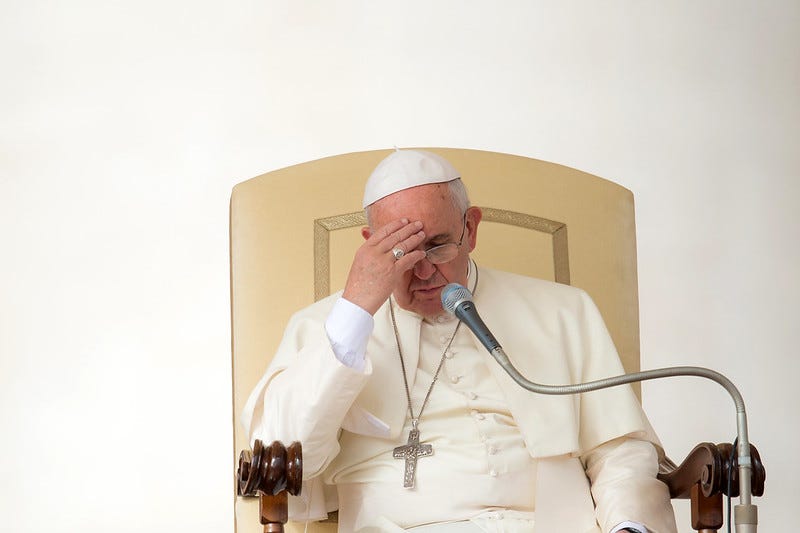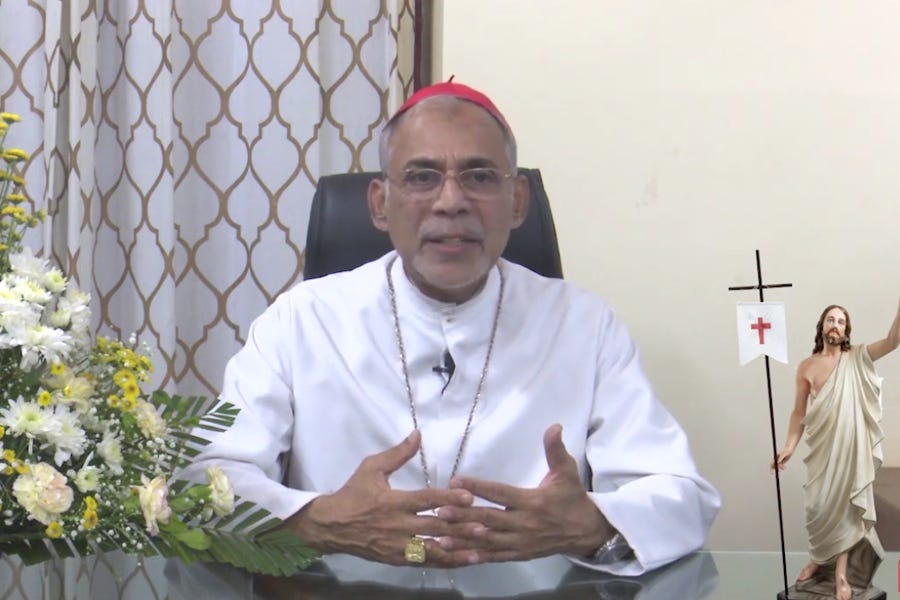Vatican departments are waiting for directions from Pope Francis to respond to documents and proposals of the Synodal Way underway in Germany, officials at several Vatican congregations have told The Pillar.
Curial officials warned that time is running out for the Vatican to act, adding that some controversial departures from Church teaching and discipline are already underway in Germany.
Speaking to The Pillar, a senior official at the Congregation for Bishops said that “many of the problematic ideas we see proposed by the German synodal process are practically already occurring at the parish level,” including the blessings of same-sex unions and intercommunion with Protestants.
“There is a growing sense, a fear really, that the cork is already out of the bottle in many places,” said the official who requested anonymity as a condition for speaking.
The official said that concern is growing in several other curial departments, including the Pontifical Council for Legislative Texts, and the Congregation for the Doctrine of the Faith, that unless Pope Francis were to intervene directly, the Germans could succeed in bringing forward radical departures from Church teaching and practice.
“There is a great deal of alarm at the level of officials,” he said, “but the situation is very advanced and the options for quiet correction are very few.”
In February, The Pillar reported on a document proposed by one of the synod way’s working groups to effectively democratize Church governance. The proposals include the election of bishops and parish pastors, and subjecting bishops’ exercise of governance to the veto of lay committees. The document also reiterated proposals for women’s ordination.
A second curial official, close to the Congregation for the Doctrine of the Faith, told The Pillar that the German proposals for intercommunion and the blessing of same-sex unions are well known at the Vatican, and considered irreconcilable with Church teaching and discipline. Officials have previously issued correctives on the subject of intercommunion with Protestants to the German bishops, the official said.
Despite those efforts, the official said, it is widely understood that German synodal plans are still going ahead, and the CDF leadership is now waiting for clear instructions from the pope on how to proceed.
“It’s well known that there are German parishes using these blessings, and intercommunion is a practical reality in many places,” the official said. “But the problem is: the more dramatic the situation becomes, the more dramatic any solution will have to be, and no one is willing to act without the pope’s explicit instructions.”
“Officials, the undersecretary, everyone can agree that there is a problem, but the prefect [Cardinal Luis Ladaria Ferrer] is not going to make a public statement or try to correct the whole [German bishops’] conference unless the pope tells him to. Otherwise, what if the pope doesn’t support him? It could make things even worse.”
“The cardinal [Ladaria] sees his job as one of service to the Holy Father,” the official said, “but his mentality is ‘reactive’ in this sense; if the pope tells him to do something he will, but he will not be proactive.”
The official at the Congregation for Bishops also noted the limited capacity for response by Vatican curial departments. “We can write letters, the nuncio can speak to the [German] bishops, but this becomes a question of fundamental communion with the Holy See, and only the pope can address that.”
Several German bishops have stated publicly their support for introducing same-sex blessings and intercommunion with Protestants, despite their conflict with Catholic teaching and discipline.
Last month, Bishop Peter Kohlgraf of Mainz reiterated his support for the recognition of same-sex unions by the Church and defended his endorsement of a book of blessings and liturgical rites for same-sex unions.
Pope Francis has warned in the past that the German synodal assembly, which began in 2019 and is scheduled to conclude next year, has no authority to change the discipline or doctrine of the Catholic Church.
In a letter to the entire Church in Germany in 2019, Francis warned against giving in to “a new Pelagianism” that would “tidy up and tune the life of the Church, adapting it to the present logic.” The pope urged The Germans to avoid becoming a “well organized and even ‘modernized’ ecclesiastical body, but without soul and evangelical novelty.”
Shortly thereafter, the Congregation for Bishops issued a forensic rejection of the Germans’ synodal plan, its subject matter, structures, and proposed outcomes, but the process has continued, developing recommendations on changes to the Church’s canon law and doctrinal teaching in several areas, including Church governance, sexual morality, priesthood, and women’s ordination.
More recently, Pope Francis has expressed his “dramatic concern” at the direction taken by the German bishops, but without having any apparent effect on the German synodal process.
Bishop Bätzing has called for the German syndoal process, and its conclusions, to be treated at the forthcoming meeting of the Synod of Bishops in Rome, scheduled for October 2022. But, the official at the Congregation for Bishops told The Pillar, that would be too late to have any effect on the German process.
“The Germans have been clear they wish to see their plan, a federal vision of ecclesiology, brought to all corners of the Church. It is not a plan for the Church in Germany, or even a plan for a German Church, it is a German plan for the whole Church.”
“You can debate the validity of this plan at a synod in Rome, perhaps even reject it for the Church universally, but if the decision is already taken in Germany for Germany and being implemented, reversing this could take generations or more.”
The official pointed to the penultimate session of the German synodal assembly planned for the end of September, which is expected to discuss proposals from the various working groups treating issues like Church governance, women’s ordination, and sacramental practice.
“The synodal session in September will be very important,” the official said, noting that the German bishops’ conference executive is expected to meet in the month prior to make its own determination on behalf of the country’s bishops.
“Before that, everything possible will be done to warn, to advise, to admonish,” said the official, “but there is no more we can do. Finally, either the Holy Father will speak and they will listen, or not.”




